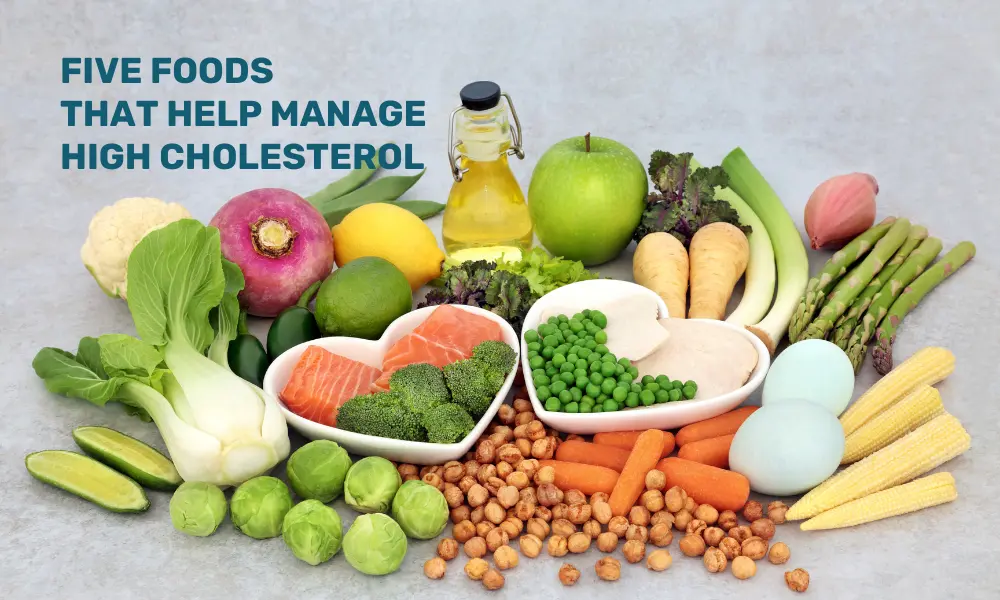Cholesterol is an essential element that plays a crucial role as a building block for our cell membranes. However, too much bad cholesterol may adversely impact our heart health.
Our liver naturally creates cholesterol, which travels throughout the body using proteins in the bloodstream. In addition to its cell-building role, cholesterol is important for producing hormones, vitamin D, and substances that help digest food, especially fatty foods.
However, a person’s lifestyle and genetics can cause the body to produce too much cholesterol. When cholesterol builds up in the arteries, it can block the blood flow, leading to coronary heart attack, heart disease, or stroke.
The key to managing cholesterol levels is to avoid certain foods and include a few in our diet. Following a nutritious and balanced diet can help moderate cholesterol levels.
The foods we eat play an important role in keeping cholesterol numbers low. The best part is that you do not have to put many restrictions on your diet to see positive changes.
Foods to Avoid with High Cholesterol Levels
One must reduce saturated fat intake as part of daily calories. It is advisable to limit the intake of the following foods to manage the cholesterol level:
-
Pork, Fatty Beef, Lamb
-
Poultry with skin
-
Saturated vegetable oils, like palm oil, palm kernel oil, and coconut oil
-
Dairy products that are made from whole or reduced-fat milk
Avoiding trans fats is equally important. Some foods that are high in trans fats may include:
-
Buttered Popcorn
-
Commercially Fried Foods
-
Potato Chips and crackers
-
Bakery goods that contain shortening
-
Packaged cookies, cakes, donuts, and pastries
-
Products containing partially hydrogenated vegetable oils
Making small changes in our daily eating habits can help reduce the LDL cholesterol contributing to fatty buildup in our arteries. Here are five foods that can help an individual lower cholesterol, thereby keeping the heart healthy:
Chia seeds
Chia seeds are rich in essential omega-3 fatty acids. Increasing these healthy fats daily has been associated with lowering the risk of cardiovascular issues. Omega-3 fatty acids have little impact on LDL but can help raise HDL cholesterol and lower triglycerides, fat in our blood.
Almonds
Almonds can help lower LDL cholesterol while maintaining or even increasing HDL cholesterol, which helps remove other forms of cholesterol from our bloodstream. If an individual dislikes eating almonds, options to improve cholesterol levels include macadamia nuts, hazelnuts, walnuts, and pistachios.
Broccoli
There is a connection between consuming vegetables and reducing the risk of heart disease. Broccoli, due to its soluble fiber, helps managing high cholesterol. Other cholesterol-busting vegetables may include spinach, Brussels sprouts, and collard greens. In addition to supplying antioxidants and vitamins eating vegetables regularly can help lower cholesterol.
Watermelon
To lower cholesterol, one must replace sugary snacks with sweet watermelon. Watermelon naturally contains lycopene, which has lipid-lowering properties, reducing total and LDL cholesterol. For those who don’t like watermelon, consider adding apples, grapes, strawberries, citrus fruits, or avocados to your diet. These are rich in pectin, a soluble fiber that lowers LDL cholesterol.
Oat bran or Oatmeal
Oats are rich in fiber, including soluble fiber that reduces cholesterol absorption in our digestive system. Additionally, fiber is also helpful for avoiding insulin spikes that may drive up bad cholesterol levels.
Managing cholesterol levels can be challenging, but by eating right, we can achieve a healthy level of cholesterol, thereby reducing the risk of heart disease, attack, or stroke. For professional help on diet, consult a nutritionist.
FAQ on Cholesterol:
What food causes high cholesterol?
The foods that may increase cholesterol may include:
-
Fried foods
-
Butter
-
Full-fat dairy, like cream, whole milk, and butter
-
Red meat, like beef, pork, and lamb, as well as processed meats like sausage
-
Baked goods and sweets
-
Oils such as coconut oil, palm oil
What foods reduce cholesterol?
-
Fruit and vegetables
-
Unsaturated fats
-
Oats and barley
-
Beans and lentils
-
Nuts and seeds
Is milk bad for cholesterol?
Consuming whole-fat dairy products can have the unwanted health effect of increasing your LDL cholesterol levels.





